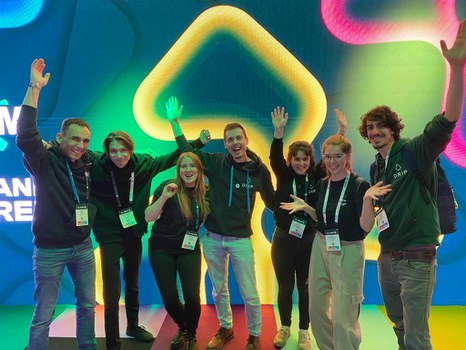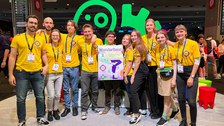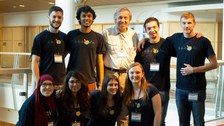iGEM/BIOMOD
iGEM and BIOMOD are annual competitions students can participate in.
iGEM
The International Genetically Engineered Machine (iGEM) competition is the premiere undergraduate Synthetic Biology competition. iGEM began in January of 2003 with a month-long course at the Massachusetts Institute of Technology and has now evolved inot an international competition with over 300 teams participating every year. More information.
In 2023, 2022, 2019, 2017, 2015, 2010, and 2009 BIOTEC/CMCB Master Students participated in this competition.
2023 iGEM Competition The TUD Team addressed the increasing micropollution of water with pharmaceuticals and microplastic by immobilizing Laccase and PETase on the Bio-Silica of Diatoms, using an in vitro and in vivo approach. With this living platform the team aims to reduce the load of pollutants in the effluent of wastewater plants.
2022 project of the team WunderBand developed a bioresponsive hydrogel platform for the treatment of chronic wounds. Their modular system enables the tunable release of therapeutics in response to inflammatory factors and infections. The team was awarded a gold medal for their development.
2019 project of the Team DipGene developed a new methodology that makes genetic testing as easy as a pH-test . With their simple, cheap and low-tech method to test for the presence of any DNA sequence, they won a Gold Medal.
2017 project of the team "EncaBcillus It's a trap!". BIOTEC/CMCB Master Students participated in this competition. This year's team "EncaBcillus It's a trap!", an association of students from CMCB and the Faculty of Biology under the direction of Prof. Thorsten Mascher, won a gold medal and was nominated in 4 categories (best poster, best part, best part collection, best fundamental advanced project). The project was built on Peptidosomes, spherical compartments with a stable but selectively permeable anorganic shell and liquid inside which were invented by Assoc. Prof. Hans-Georg Braun (IPF Dresden). The team aim at introducing Peptidosomes as a new fundamental approach for generating and applying encapsulated bacteria. Besides labwork, the team was active in their initiative "iGEM goes green" to promote sustainable research.
2015 project SPACE-P (Structural Phage Assisted Continuous Evolution of Proteins), won a bronze medal.
Link to the 2010 project.
The team of the 2009 project won the silver medal for its project of the nano Factory.
BIOMOD
is a biomolecular design competition organized by the Wyss Institute at the Harvard University (USA). More information.
Since 2012, teams of students of our master's programs Molecular Bioengineering and Nanobiophysics have been participating quite successfully.
With their novel design of a two-component drug delivery system involving drug-carrying liposomes and a peptide-based release mechanism, the team Find'n'Bind 2018 successfully participated in this year's BIOMOD. Besides performing cutting edge experimental research, the team designed a website wiki about their research project, created a YouTube video and finally presented everything on the Jamboree in the USA at the University of California, San Francisco. The event took place on October 27-28 and the team received a silver project award and took second place in the YouTube video contest.
In 2016, an interdisciplinary team of masters' students Molecular Bioengineering and Nanobiophysics was awarded with the gold medal for its project "I, nanobot". The project consisted of a micro-sized device capable of transport and deliver a cargo in a controlled manner. It was the result of linking a magnetic Dynabead(r), which allows the external control of movement with a variable magnetic field, to a vesicle for the transportation and delivery of the cargo. Targeted drug delivery and biosensoring are some possible applications that this device might have in the fields of medicine and molecular biology.
Link to video 2018 of the team "Find'n'Bind"
Link to the project 2014 of the team "Dresden DNAmics"
Link to the project 2013 of the team "Dresden Nanormous"
Link to the project 2012 of the team "Dresden Nanosaurs"












